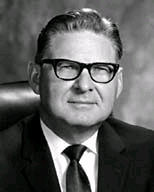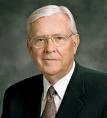FROM THE PROPHETS
![]() This is what our prophets have counseled us to do and how to be more "self-reliant:"
Printable version
This is what our prophets have counseled us to do and how to be more "self-reliant:"
Printable version

Prophetic Warnings
|
Harold B. Lee |
“The trouble with us today, there are too many of us who put question marks instead of periods after what the Lord says. I want you to think about that. We shouldn’t be concerned about why he said something, or whether or not it can be made so. Just trust the Lord (Ensign, January 1973, p. 108).” |
|
Joseph Fielding Smith |
“We hear occasionally somebody make the statement that things are as bad as they could be, that they could not be worse. I want to tell you they could be worse, a great deal worse. If I read the sign of the times, we have not suffered yet as much as we are going to suffer, unless we repent….We have had ample warning. We have been told of calamities that are coming. We have been taught how we might avoid them, how we might be protected, if we would only hear the counsels that some to use, heed the testimony of truth. If we fail we cannot escape…” (Doctrines of Salvation, vol. III, p.31). |
|
Ezra Taft Benson |
“Many people do not believe that serious recession will ever come again. Feeling secure in their expectation of continuing employment and a steady flow of wages and salaries, they obligate their future income without thought of what they would do if they should lose their jobs or if their income stopped for some other reason. But the best authorities have repeatedly said that we are not yet smart enough to control our economy without downward adjustments. Sooner or latter these adjustments will come (The Improvement Era, June 1957, p. 414). |
|
Spencer W. Kimball |
“We encourage families to have on hand this year’s supply; and we say it over and over and over and repeat over and over the scripture of the Lord where he says, “Why call ye me, Lord, Lord, and do not the things which I say?” (Luke 6:46) How empty it is as they put their spirituality, so-called, into action and call him by his important names, but fail to do the things which he says…”(The Teachings of Spencer W. Kimball, p. 375). |
|
Marion G. Romney |
“One of the three areas emphasized in the mission of the Church is to perfect the Saints, and this is the purpose of the welfare program. This is not a doomsday program, but a program for our lives here and now, because now is the time for us to perfect our lives. May we continue to hold fast to these truths” (Ensign, March 2009, p. 65). |
|
Elder Neal A. Maxwell |
“We cannot, [when] offered so many opportunities to do so, get oil for our lamps at the last minute. Nor can most of us suddenly acquire a year’s supply of food, nor can we break free of debt in a moment- especially when it has taken us years to get so deeply in debt” (All These Things Shall Give Thee Experience, p. 117).
|
|
Gordon B. Hinckley |
“…I also raise my voice of warning that unless we can change the direction of the family, unless we can muster the discipline to pay our debts and live with honesty and integrity with ourselves and future generations, much of the good that science brings [in the 21st century] will be offset by the growing evils that have become so obvious in our day” (21st Century Talk given to LDS businessmen, 1995).
|
Limited Capacity of the Church to feed all Members
|
Presiding Bishop- Victor L. Brown |
“We are concerned that because the Church program includes projects, canneries, bishops’ storehouses, Deseret Industries, and other visible activities, our people are mistakenly led to believe these things replace the need for them to provide for themselves. This is simply not so. The evidence that this illusion exists, is seen in the experience of the last few months as the draw on fast offerings and storehouse commodities has spiraled” (Ensign November 1980, p. 81). |
|
Ezra Taft Benson |
“Our Bishop storehouses are not intended to stock enough commodities to care for all members of the Church. Storehouses are only established to care for the poor and the needy. For this reason, members of the Church have been instructed to personally store a year’s supply of food, clothing, and, where possible, fuel. By following the counsel, most members will be prepared and able to care for themselves and their family members, and be able to share with others as may be needed” (Ensign, May 1977, p.82).
|
|
James E. Faust |
“The Church cannot be expected to provide for every one of its millions of members in case of public or personal disaster. It is therefore necessary that each home and family do what they can do to assume the responsibility for their own hour of need” (Ensign, May 1986, p.22). |
Recent Prophetic Counsel
|
1st Presidency- Gordon B. Hinckley, Thomas S. Monson, James E. Faust |
“Our Heavenly Father created this beautiful earth, with all its abundance, for our benefit and use. His purpose is to provide for our needs as we walk in faith and obedience. He has lovingly commanded us to ‘prepare every needful thing’ (See D&C 109:8) so that, should adversity come, we may care for ourselves and our neighbors and support bishops as they care for others. We encourage Church members worldwide to prepare for adversity in life by having a basic supply of food and water and some money in savings. We ask that you be wise as you store food and water and build your savings. Do not go to extremes; it is not prudent, for example, to go into debt to establish your food storage all at once. With careful planning, you can, over time, establish a home storage supply and a financial reserve. We realize that some of you may not have financial resources or space for such storage. Some of you may be prohibited by law from storing large amounts of food. We encourage you to store as much as circumstances allow. May the Lord bless you in your home storage efforts” (All Is Safely Gathered In- Family Home Storage, 2007, p. 2).
|
|
President Thomas S. Monson |
“Many areas of the world have experienced difficult economic times. Businesses have failed, jobs have been lost, and investments have been jeopardized. We must make certain that those for whom we share responsibility do not go hungry or unclothed or unsheltered. When the priesthood of this Church works together as one in meeting these vexing conditions, near miracles take place. We urge all Latter-day Saints to be prudent in their planning, to be conservative in their living, and to avoid excessive or unnecessary debt” (To Learn, To do, To Be. General Conference, October 2008). |
|
Elder M. Russell Ballard |
“Often in my ministry have I heard the sad tale of those who are struggling to become self-reliant but in fact are becoming more dependent upon others because of their inability to think straight and apply common sense in the decisions they make. Much of life’s misery centers in the lack of common sense….Helping people to think straight and use common sense will, in my judgment, always be a very important step in helping them to reach economic self-reliance” (Ensign, March 2009, p. 54). |
PROPHETS SPEAK
- “Often in my ministry have I heard the sad tale of those who are struggling to become self-reliant but in fact are becoming more dependent upon others because of their inability to think straight and apply common sense in the decisions they make. Much of life’s misery centers in the lack of common sense...Helping people to think straight and use common sense will, in my judgment, always be a very important step in helping them to reach economic self-reliance” (Elder M. Russell Ballard, Ensign, March 2009, p. 54).
Email: johnjen at reynoldsnet.org












